LATEST NEWS

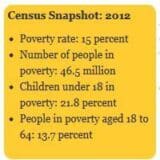
Recovery?
What recovery? The economic outlook may have picked up for some Americans, but not for those in the bottom income brackets – and especially children — according to figures released by the U.S. Census Bureau on Tuesday.
In fact, there were nearly seven million more people living in poverty in 2012 than there were in 2008, the beginning of the Great Recession.
Overall, 46.5 million people were living at or below the poverty line last year, according to the agency’s major annual report on the issue, the Current Population Survey. And more than one-fifth of children, or 16 million youth, were living in poverty, the survey showed.
“They are still the age group suffering the most poverty,” Deborah Weinstein, executive director of the Coalition on Human Needs, said in a statement.
It was the 11th year in the last 12 that poverty “worsened or failed to improve,” according to the Center on Budget and Policy Priorities.


Two years ago the “Occupy” movement roared into view, summoning the energies and attention of large numbers of people who felt the economic system had got out of whack and were determined to do something about it.
Occupy put the issue of the nation’s savage inequality on the front pages, and focused America’s attention on what that inequality was doing to our democracy. To that extent, it was a stirring success.
But Occupy eschewed political organization, discipline, and strategy. It wanted to remain outside politics, and outside any hierarchical structure that might begin to replicate the hierarchies of American society it was opposing.
So when mayors, other public officials, and university administrators cleared the Occupy encampments by force — encampments that had become the symbol of the movement — nothing seemed to remain behind. Some Occupiers made plans for further actions, but a movement without structure, discipline, and strategy proved incapable of sustaining itself.
» Read more about: Occupy Wall Street’s Bittersweet Birthday »


One in four adolescents in California—nearly one million—aren’t getting as much physical activity as they need to maintain a healthy weight. When a young Latino child living in a highly industrialized community gets out to play, how much good does that physical activity do her growing lungs if she’s inhaling a toxic soup of air pollution and greenhouse gases? What if she is more likely to get struck by a speeding car than she is to benefit from a lifetime of physical activity? For an African American child who has no nearby park, safe sidewalks or fresh air, there’s got to be a better answer.
A constellation of factors in the physical, social, economic and service environment are referred to as the social determinants of health because they have an overwhelming influence on health, quality of life and death rates, as compared to medical care — which is only responsible for 10-15 percent of what determines how healthy we are and how long we live.
» Read more about: How SB 1 Can Help Reduce Health Inequities »
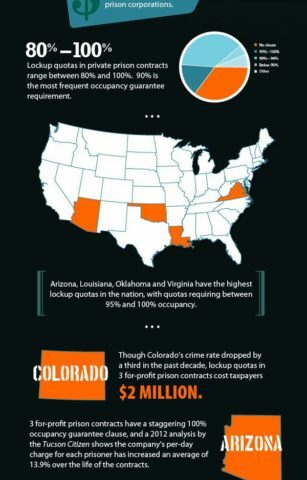
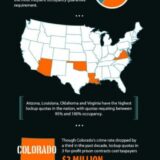
Today In the Public Interest released a report titled Criminal: How Lockup Quotas and “Low-Crime Taxes” Guarantee Profits for Private Prison Corporations.
The study documents the shocking prevalence of contract language between private prison companies and state and local governments that guarantee prison occupancy rates, which can accurately be described as “lockup quotas.”
If the quota is not met due to lower crime rates and a falling prison population, taxpayers are forced to pay for empty beds in what essentially amounts to a “low-crime tax” on communities.
Lockup quotas can have broad negative implications beyond obvious financial concerns and should be prohibited in any private prison contract. See report infographic below and the report here.
The more people are aware of lockup quotas the more we as a community are empowered to prevent this type of predatory language from existing in private prison contracts —
» Read more about: Stop Prison Inc. from Pushing Lockup Quotas »


Sunday’s Los Angeles Times carried one of those state-of-the-economy articles indicating that Americans are becoming more realistic in their estimates of their place on the country’s social ladder. Headlined, “Amid slow economic recovery, more Americans identify as ‘lower class,’” Emily Alpert’s feature focused on the latest General Social Survey, a 40-year research project conducted biannually by the National Opinion Research Center (NORC) at the University of Chicago.
The upshot is that fewer low-income people are clinging to the fantasy that they form part of the “middle class” – or even the “working class.” Instead, they are coming to realize that they help comprise the “lower class,” a destination once regarded as an economic leper colony but now accepted as just another fact of life.
As Alpert reports, the GSS revealed that “a record 8.4 percent of Americans put themselves in that category — more than at any other time in the four decades that the question has been asked on the General Social Survey.”
Since the start of the 2009 recession we’ve become acquainted with – almost inured by – metrics showing how high up on the economic pyramid people unreasonably see themselves.
» Read more about: A Touch of Class: Knowing Our Place on the Social Ladder »
Frying Pan News reviewer Vivian Rothstein called Go Public: A Day in the Life of an American School District “an antidote to the doom and gloom pronouncements of Waiting for Superman and other recent corporate-sponsored films.”
This documentary, created by Jim and Dawn O’Keeffe, memorably follows 50 individuals (students, faculty and others) during a single school day. Its filmmakers focus on Pasadena’s public school district as it struggles to head off catastrophic budget cuts to 28 schools. It’s a primer on the importance of public education and how successful it can be with the support of parents and administrators.
The film can be seen in three widely separate local venues this weekend. On Saturday it’s part of the Catalina Film Festival and screens 1-3 p.m. at the Lancer Auditorium in Avalon. Sunday, it shows at Pasadena’s Lake Avenue Church (1-3 p.m.) and at USC’s Ray Stark Family Theater (6-8 p.m.).
» Read more about: ‘Go Public’ School Documentary Screens This Weekend »


The Democratic Party’s romance with Wall Street may finally be breaking up. In the past 10 days, a diverse group of Democratic senators scuttled Larry Summers’s candidacy for Federal Reserve chair and New York Democrats voted for the mayoral candidate whose campaign was an attack on Michael Bloomberg’s care and feeding of the super-rich at the expense of the rest of the city. Former commerce secretary (and JP Morgan Chase executive) William Daley’s surprise withdrawal from the Illinois Democratic gubernatorial primary is one more indication of Wall Street’s diminished sway.
Democrats have reached a watershed. After two decades in which the party has moved leftward on social issues but has largely accepted the financial sector’s economic preferences — for smaller government; a greater role for markets; and reduced regulation, particularly of finance — the abject failures of the market economy are pushing the party leftward.
» Read more about: Summers of Our Discontent: Wall Street’s Luster Fades »


Here’s a surprisingly little secret: You know all those dates you see on food products—sell by, use by, best before? Those dates do not indicate the safety of your food, and generally speaking, they’re not regulated.
If this is news for you, you’re not alone. In fact, according to one industry study, 90 percent of Americans at least occasionally throw food away prematurely because they mistakenly interpret the date label to mean their food is unsafe; 25 percent do so every time. In the U.K., they’ve estimated about 20 percent of food wasted in households is due to confusion over expiration dates. If this same estimate were true here, it would mean the average household of four could be spending $275-450 on discarding food that is perfectly fine, just because they misinterpret the label date.
Today, in partnership with the Harvard Food Law and Policy Clinic,
» Read more about: Misleading Food Sell-By Dates: Waste Not, Toss Not! »
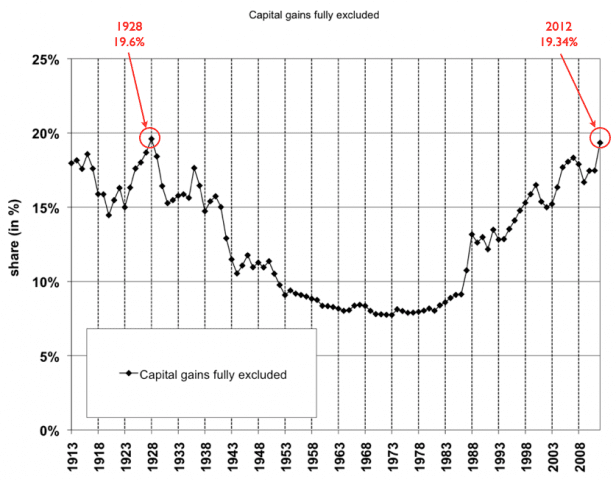
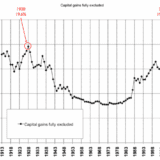
Are our rich content? It’s a question that bounces back and forth in the blogosphere. Are elites, economic and otherwise, happy with the pace of the weak recovery? Are they indifferent? Or are they actively worse off than they would be if unemployment were lower?
This question comes up when Emmanuel Saez updates his data on the incomes of the top one percent. Most of the coverage has focused on the rate of change for incomes of the top one percent, particularly the fact that the top one percent have enjoyed 95 percent of all income growth from 2009 to 2012. But I want to focus on levels. I’m going to modify one of Saez’s charts to show something I don’t think has been pointed out:
This is the percentage of all income, excluding capital gains, that goes to the top one percent.
» Read more about: Why 2012 Was the One Percent’s Favorite Year Since 1928 »


(Note: Katha Pollitt’s feature first appeared in The Nation and is republished with permission.)
Here’s a little window into poverty, American- style. According to a Yale University study published in August in Pediatrics magazine, almost 30 percent of low-income women with children in diapers can’t afford an adequate supply of them, with Hispanic women and grandmothers raising grandchildren the most likely to be in need. Some women are forced to make one or two nappies last the whole day, emptying them out and putting them back on the baby. Based on a survey of almost 900 low-income women in and around New Haven, Connecticut, investigators found the lack of diapers—such a simple thing—had profound and complex effects. The risks to children’s health are obvious: rashes, urinary tract infections, painful chafing. (If a mom is too poor to afford diapers, she probably can’t afford diaper cream or wipes or baby powder,
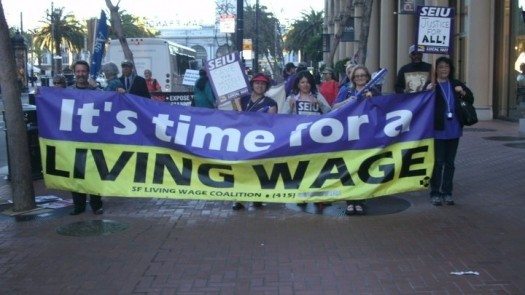
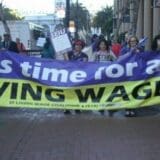
In 2004, after a long string of Republican governors and the shockingly narrow defeat of Prop. 72—which would have ushered in the most progressive health care reform ever implemented in the United States—California labor leaders got mad. And then they got organized.
“We said, we’re never going to lose that bad again—what do we have to do to change?” said California Labor Federation Executive Secretary-Treasurer Art Pulaski, who moderated [last] Wednesday’s AFL-CIO 2013 Convention panel discussion “Winning and Building Over Time: Winning in California and You Can, Too.”
The federation decided to do an extensive poll of all of their unions and labor council affiliates, asking members how they voted, who they voted for and what kinds of actions they took, and then conducting an analysis. They discovered that some unions and locals were vastly out-performing others, and that if each affiliate had carried their own weight,


Today Walmart opened its newest supermarket, a 33,000-square-foot “grocery store” on the Chinatown corner of Cesar Chavez and Grand avenues. It’s a stone’s throw from Our Lady of the Angels’ stained-glass windows and within shouting distance of dozens of small local businesses now threatened with extinction. Local community groups had fought Walmart’s arrival as a corporate intrusion into the historic neighborhood – the store represents the retail giant’s deepest penetration into urban Los Angeles yet.
For now the new store’s critics and business competitors await the worst.
“It’s just sad for a small economy like Chinatown’s to have a large national chain whose money is going out of state and not staying in the community,” says Steven Y. Wong, interim executive director of Los Angeles’ Chinese American Museum. Wong, who says that his comments are his private opinions and not those of the museum, adds that the store “drastically changes the character of the neighborhood and will have a long-term,
» Read more about: As Walmart’s Chinatown Store Opens, Questions Remain »
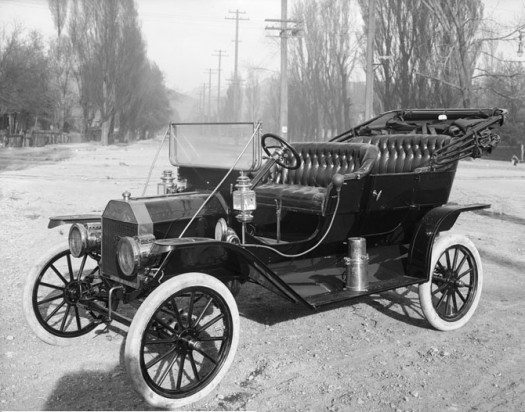

Forbes magazine, which calls itself the “capitalist tool,” seems to have a penchant for publishing right-wing diatribes posing as serious economic analyses. The latest is by Paul Roderick Gregory, who accuses me of “false facts and false theories” in a recent piece I wrote about why high wages are good for the economy.
If I’m correct, Gregory asks, how could it possibly be that America become world’s richest and most powerful economy in late nineteenth century, when the typical worker was earning peanuts?
Gregory claims to be an economic historian but he doesn’t seem to know American history. The answer is simple: Ours was a land of unbounded natural resources. We also found it relatively easy to copy the industrial advances of England and Germany, and erected a protective tariff so that our manufacturers didn’t have to compete directly with them. A giant wave of immigrants came to our shores,
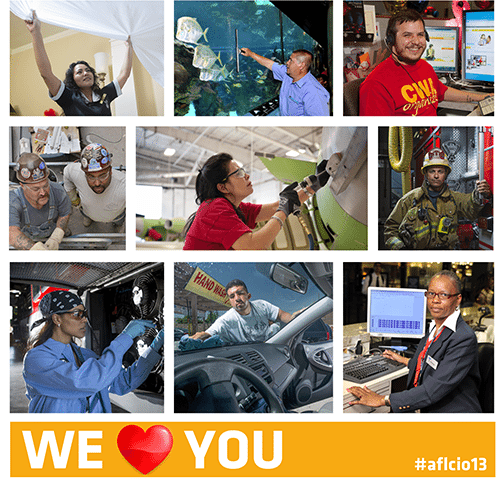

Lazy. Out of touch. Greedy. Self-serving. Thuggish.
Chances are you’ve heard a union member or leader called one of these things (and in all likelihood, more than once), and it made your blood boil. The unfortunate truth is that misconceptions, stereotypes and all-out lies seem to be dominating the public discussion and perception of labor unions, even among some progressives. We in the labor movement know that unions stand for the working class as the sole and vital counterbalance to corporate greed and excess…but no one else seems to have gotten the memo.
That disconnect—between what we actually do and what others think we do—is the impetus behind yesterday’s action session at the AFL-CIO Convention, entitled “10 Ways to Change How People See Unions.” Featuring AFL-CIO Secretary-Treasurer Elizabeth Shuler, AFSCME’s Chris Policano and Brandon Weber of Upworthy’s Workonomics, this exciting session focused on reintroducing unions to America by focusing on what we actually do every day for working families.
» Read more about: 10 Ways to Change How People See Unions »


They wake like cosmetic surgery patients.
Memories of crawling vanish
as the sun warms the body
they could not have dreamed of:
Dog Face,
Provence Chalk-Hill Blue,
Great Spangled Fritillary.
When the woman I married woke up
next to the wrong man,
that was my signal
to become inert,
await rebirth.
I want to be great,
spangled,
fritillary.
I want the caterpillar’s gift to the butterfly—
amnesia, and wings.
———————————————
Source: The poem originally appeared in Pearl and was reprinted in Amnesia and Wings, published by Tebot Bach (2013).
Photo: Derek Ramsey
Larry Colker has been co-hosting the weekly Redondo Poets reading at Coffee Cartel in Redondo Beach for more than a decade. His poems have appeared in Spillway,
See original feature by Gary Cohn, “Slash and Burn: The War Against California Pensions.”
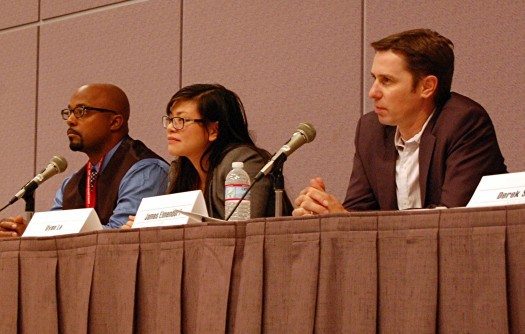

The AFL-CIO closed out its quadrennial convention in Los Angeles yesterday with a morning remembrance to the victims of 9/11 before delegates rolled up their sleeves and finished up with a day of internal housekeeping and policy chores.
The convention might be remembered most for debuting its highly popular afternoon Action Sessions. Comprising about 50 workshops and panels over three days, these sessions gathered together innovative thinkers, cutting-edge organizers and committed activists from around the country to share the lessons learned in hard-won battles to moved labor to the center stage of a 21st century economy.
Collectively they signaled the AFL-CIO’s seriousness about returning to the grass roots and leveraging one area where labor remains unrivaled and undiminished — its organizational power.
This commitment was especially clear at a Wednesday Action Session entitled “Policy Initiatives That Enable Organizing: Living Wage and PLA Campaigns.”
Moderated by James Elmendorf,
» Read more about: AFL-CIO Convention: A Tale of Two Action Sessions »


What would you do if your employer charged you a fee for everything you needed to work for them: your office desk, your computer, your phone line, your chair, your share of the water cooler and internet connection? What would you do if at the end of a week you were left with just one percent of your paycheck after all these had been deducted? How long would it take for you to stand up and refuse to keep paying to access the tools that allow you to do your work?
As you can see in the paycheck image above, that is the situation that truck drivers from the port trucking company, Pacific 9 Transportation, are facing. Drivers at Pac 9 move cargo to and from the ports of L.A. and Long Beach. The trucks they drive are leased from the company at $125 per week ($537.50 per month). In addition to the lease,
» Read more about: Port Truck Drivers Seek Millions in Owed Wages »


On a side street that runs alongside the World Trade Center, two bronze bas-relief murals depicting rescue scenes from 9/11 are affixed to a wall facing the construction site. One reads, “Dedicated to Those Who Fell and Those Who Carry On.” The other admonishes us to “Never Forget.”
When I had a chance to write my own name of the 90th floor of the new tower going up on the site of the two that were destroyed, I wrote “Remember,” underneath my name. But aside from keeping the sacrifice and bravery of those who died on 9/11 in our thoughts, what was the content of the memory that I was supposed to protect? What are those memories supposed to tell me about how to live now, how to act personally and politically in this world?
To some extent, the struggle over what would replace Ground Zero has been an argument about memory and its uses.


What happens when you grow up with a father who lost everything in the Great Depression? For Howard Sherman, you spend the rest of your life studying the causes of devastating financial collapses and how nations can avoid them.
With 22 books and more than a hundred articles, Sherman — a Visiting Scholar at UCLA and former chair of the U.C. Riverside Economics Department — is still fighting the good fight. His latest volume is Principles of Macroeconomics: Activist vs. Austerity Policies, co-written with Michael Meeropol. While the title may be dry, Sherman is anything but. In a recent interview, he offered blunt assessments of President Obama’s economic policies and why the U.S. labor movement should make full employment its highest priority.
Frying Pan News: Why did you write this book?
Howard Sherman: The main issue in economics is the distribution of income between workers and owners.
» Read more about: Economist Howard Sherman: Why Labor Should Fight for Full Employment »